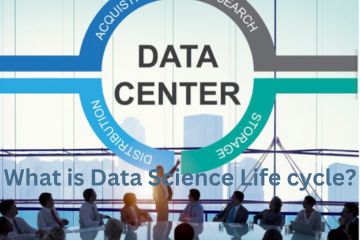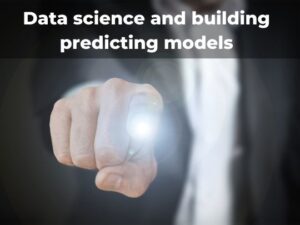Table of Contents
ToggleIntroduction:
Data science has become an integral part of decision-making and innovation in various industries. However, the process of extracting insights from data is not a straightforward one. It requires a systematic and well-defined approach known as the Data Science Life Cycle. In this article, we will explore the different stages of the Data Science Life Cycle, highlighting the key tasks and considerations at each stage. Understanding this life cycle is essential for data scientists and organizations to effectively leverage data and derive actionable insights.
Are you looking to become a Data science expert? Go through 360DigiTMG’s in Best Data Science in BangaloreDefining the Data Science Life Cycle:
The Data Science Life Cycle is a structured framework that guides the process of solving complex problems and deriving insights from data. It encompasses a series of interconnected stages, starting from problem definition and ending with the deployment of data-driven solutions. The typical Data Science Life Cycle consists of the following stages:
Problem Definition: This initial stage involves understanding the business problem or objective that needs to be addressed. Data scientists collaborate closely with stakeholders to clearly define the problem statement, set goals, and establish measurable success criteria. It is crucial to have a solid understanding of the problem domain and the specific requirements of the organization.
Data Acquisition and Understanding: Once the problem is defined, the next step is to gather the necessary data. This may involve identifying relevant data sources, collecting data from various databases, APIs, or external sources, and ensuring data quality and integrity. Data scientists must also explore and analyze the acquired data to gain insights into its structure, patterns, and potential limitations.
Data Preparation and Cleaning: In this stage, the collected data needs to be preprocessed and cleaned to remove inconsistencies, handle missing values, and address any anomalies or outliers. Data scientists perform tasks such as data transformation, feature engineering, and data integration to ensure that the data is in a suitable format for analysis.
Earn yourself a promising career in Best Data Scientist by enrolling in Best Data Science in Chennai Program offered by 360DigiTMG.Exploratory Data Analysis (EDA): EDA involves exploring and visualizing the data to gain a deeper understanding of its characteristics, relationships, and trends. Data scientists use statistical techniques, visualization tools, and domain knowledge to identify patterns, correlations, and potential variables that may influence the problem at hand. EDA guides subsequent modeling and analysis decisions.
Model Development and Selection: In this stage, data scientists develop and refine models to solve the problem defined earlier. They employ various techniques such as statistical modeling, machine learning algorithms, or deep learning architectures, depending on the nature of the problem and the available data. Model selection involves evaluating different models, considering their performance metrics, interpretability, and scalability.
Model Training and Evaluation: Once the models are selected, they need to be trained using appropriate training data. This stage involves splitting the data into training and validation sets, tuning model parameters, and iterating the training process to optimize model performance. The trained models are then evaluated using appropriate evaluation metrics to assess their accuracy, robustness, and generalizability.
Model Deployment and Integration: After successfully training and evaluating the models, the next step is to deploy them in a production environment. This involves integrating the models into the existing systems or workflows, ensuring scalability, and addressing any technical challenges. Data scientists collaborate with software engineers and IT teams to develop a seamless deployment strategy.
Model Monitoring and Maintenance: Once the models are deployed, ongoing monitoring and maintenance are essential to ensure their effectiveness and reliability. Data scientists monitor model performance, track data drift, and update models as new data becomes available. Regular maintenance involves retraining models, updating algorithms, and addressing any issues that may arise during production.
Learn the core concepts of Data Science Course video on Youtube:
Communication and Reporting: Throughout the Data Science Life Cycle, effective communication with stakeholders is vital. Data scientists need to convey their findings, insights, and recommendations to non-technical audiences in a clear and understandable manner. Visual aids, such as data visualizations, dashboards, and concise reports, are often used to present complex information in an accessible format. Communication ensures that the insights derived from data science are effectively utilized and drive informed decision-making.
Challenges and Best Practices in the Data Science Life Cycle:
Data Quality and Availability: Data scientists often face challenges related to data quality, completeness, and availability. It is crucial to invest time and effort in data acquisition and preprocessing to ensure the reliability and accuracy of the data. Exploratory data analysis can help identify data issues early on and guide the necessary data cleaning and transformation steps.
Iterative and Agile Approach: The Data Science Life Cycle is not a linear process, and it often involves iterations and adjustments at each stage. Data scientists should adopt an agile approach, working in iterative cycles to refine models, address data issues, and incorporate feedback from stakeholders. This allows for continuous improvement and flexibility in tackling complex problems.
Looking forward to becoming a Data scientist Expert? Check out the Best Data Science in Pune and get certified today.Domain Knowledge and Collaboration: Domain knowledge plays a critical role in understanding the problem, interpreting the data, and deriving meaningful insights. Collaboration between data scientists and domain experts or stakeholders is essential throughout the entire life cycle. It helps align the analysis with business objectives, validate assumptions, and ensure the practicality of the proposed solutions.
Ethical Considerations: Data scientists must consider ethical implications when working with sensitive data or making decisions based on data-driven insights. Privacy, security, and fairness should be taken into account throughout the life cycle. It is essential to adhere to legal and ethical guidelines, anonymize personal information when necessary, and ensure transparency in the decision-making process.
Documentation and Reproducibility: To ensure transparency and reproducibility, it is crucial to document each stage of the Data Science Life Cycle. Data scientists should maintain clear documentation of data sources, preprocessing steps, model development, and evaluation processes. This documentation enables others to understand and reproduce the analysis, facilitates collaboration, and contributes to the overall integrity of the work.
Continuous Learning and Upgradation: Data science is a rapidly evolving field, with new algorithms, techniques, and tools emerging regularly. Data scientists should stay updated with the latest advancements, participate in training and professional development programs, and continuously enhance their skills. Learning from past projects and feedback helps improve future iterations of the Data Science Life Cycle.
Conclusion:
The Data Science Life Cycle provides a systematic framework for extracting insights and making data-driven decisions. It involves a series of interconnected stages, including problem definition, data acquisition, preprocessing, exploratory data analysis, modeling, deployment, and maintenance. By following this structured approach, data scientists can navigate the complexities of data analysis, address challenges, and deliver valuable insights to drive innovation and improve decision-making processes.
360DigiTMG the award-winning training institute offers a Best Data Science in Hyderabad. and other regions of India and become certified professionals.Throughout the life cycle, collaboration, domain knowledge, ethical considerations, and effective communication are crucial for success. Adhering to best practices, such as iterative and agile approaches, documentation, and continuous learning, enhances the efficiency and effectiveness of the data science process.
In a rapidly evolving data-driven world, mastering the Data Science Life Cycle empowers organizations to harness the power of data, gain a competitive edge, and unlock new opportunities for growth and innovation.




